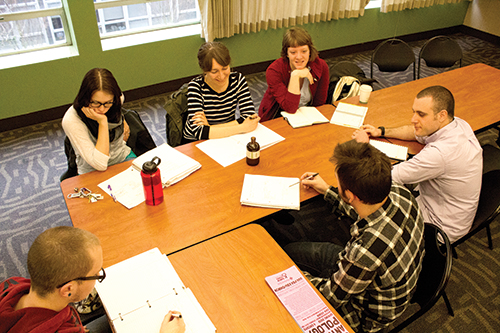Eating locally harvested foods can quickly get expensive, especially for college students, and the PSU Food Action Collective is offering a solution. FAC is leading workshops for students interested in how to eat local food on a tight budget. They are in the middle of a six-part series called Healthy, Easy, Affordable and Local.
Food activists dig up tips to help students eat local

Eating locally harvested foods can quickly get expensive, especially for college students, and the PSU Food Action Collective is offering a solution.
FAC is leading workshops for students interested in how to eat local food on a tight budget. They are in the middle of a six-part series called Healthy, Easy, Affordable and Local.
HEAL’s next event will focus on planting in Portland State’s community garden. FAC is looking for a student at PSU who is an expert gardener to take over the donated garden plot, according to Amber Wagoner, FAC co-founder.
“This is about member empowerment, and letting members choose what they’re passionate about and letting them go with it,” Wagoner said. “I think that’s how FAC has stayed so grassroots.”
Food from the garden will be used in the final workshop, where members will learn simple, three-to-eight-ingredient recipes.
“[We’ll be] using items that we bought in bulk at the grocery store, using items that we previously learned [to make], like the stocks that we made, and then items that we are also growing, and make recipes out of them,” Wagoner said.
HEAL attendees made homemade applesauce at “Let’s Get Saucy,” the first HEAL event, said Rob Duren, FAC co-founder.
“We had donations from community organizations for apples and the Mason jars, and we learned how to make applesauce together,” Duren said.
Designed to stretch student dollars, the second event was “Frugal Food for Flat Broke Folk,” for which FAC facilitated a guided tour of Whole Foods.
Next was “The Basics,” which taught members how to apply what they learned at Whole Foods to make mayonnaise and their own stock for soups, as well as other cooking tricks.
“The people who showed up to that one didn’t even have cooking experience,” said Shaundra Heide, a senior majoring in community development.
Heide joined FAC this year. She’s one of the masterminds behind HEAL.
“Our main purpose [for] doing this is to let students realize it’s a lot easier to eat healthy and locally than [they] realize,” Heide said.
Heide said the ideal volunteer gardener has experience and wants to lead workshops.
“Once we find our expert gardener, we’ll have a better idea of what we’re going to be planting,” Heide said.
“Hopefully a lot of kale, that’s my favorite.”
FAC’s HEAL series is open to anyone—students or community members.
“We really encourage people who have no knowledge about it to come. This is for beginners,” Heide said. “It’s going to be accessible to everyone.”
HEAL will plan what to grow in the community garden at an educational workshop on Wednesday, April 10. Planting will happen on Wednesday, April 24. The last workshop, focusing on cooking recipes, will take placeWednesday, May 8.
Contact FAC via email for HEAL workshop times and locations at [email protected], or visit their Facebook page at facebook.com/foodactioncollective.







